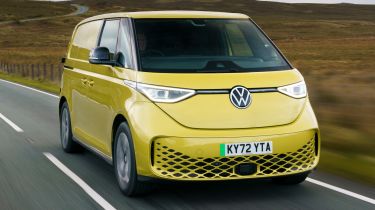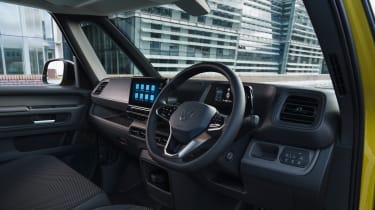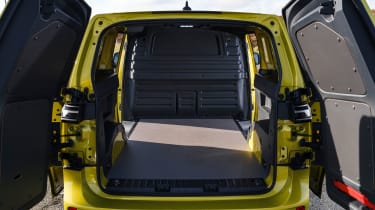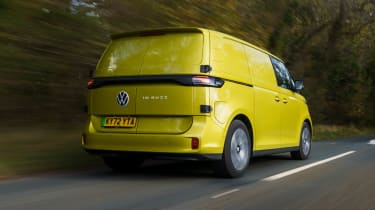Volkswagen ID. Buzz Cargo review
Much more than simply style over substance, the Volkswagen ID. Buzz Cargo is a cool-looking van that would be an asset to any forward-thinking business

Pros
- Great to drive
- Relatively long range
- Desirability
Cons
- Not as spacious as some rivals
- Feels cheaper inside than the MPV
- Only one battery for now
| Van type | Range | Wallbox charge time | Rapid charge time |
|---|---|---|---|
| Electric | 256 miles | 12hrs 15mins (0-100%, 7.4kW) | 30 mins (5-80%, 170kW) |
We’ve already heaped praise on the Volkswagen ID. Buzz MPV, but like many of its rivals, it also comes as a panel van with no rear seats and a spacious load area. But do the ID. Buzz Cargo’s retro looks come at the expense of outright space and versatility?
There is just one body size available from launch, although a longer-wheelbase model is due in 2023. You get a choice of a single-piece tailgate or split twin doors at the rear, plus sliding doors on either side of the van – all of which open to reveal 3.9 cubic metres of cargo space. That’s a usable area, though down slightly on rivals like Citroen e-Dispatch, Fiat E-Scudo and Vauxhall Vivaro Electric.
The main reason for this is the relatively high floor; the battery is mounted beneath it and the motor sits on the rear axle, which ultimately limits how much you can carry in the back. Volkswagen claims you can fit two Euro pallets in the back of the Buzz, which also features eight tie-down points and an area to store the charging cables. However, there’s no avoiding the fact you can cram just as much into the far cheaper and far smaller Citroen e-Berlingo.
But nothing in this class can match the Buzz when it comes to range. The Volkswagen’s 77kWh battery is only slightly larger than the biggest unit offered in the E-Scudo, but the official figure is much better; VW claims 256 miles on a charge, compared to the Fiat’s 202-mile maximum. Further to this, if you do most of your journeys around town, VW quotes an unbeatable 356 miles on the WLTP City cycle. Remarkably, it’s also cheaper to buy, and posts stronger residual values than its competitors, too.
Then there’s charging; despite sharing its platform and much of its hardware with the Volkswagen ID.3 and ID.4, the Buzz Cargo has an improved maximum rapid charging speed of 170kW – faster than all of its commercial rivals, including the forthcoming Ford E-Transit Custom. This should be enough for a 5-80% charge (officially over 200 miles) in half an hour. It’ll take around 12 hours to fully recharge the Buzz’s 77kWh battery via a 7kW wallbox.
Inside, you get the same basic design as you’ll find in the MPV version of the ID. Buzz, with two screens and a set of similarly-frustrating touch-sensitive controls. Storage is good, though, with big door bins, cupholders on the dash and useful cubbies. Quality can’t match the more expensive people-mover, but you expect that in a van – and the Buzz Cargo still trumps its rivals in this respect.
You get more durable black trim and seats in the Cargo, too, with a bench seat big enough to carry larger adults three-abreast. The elevated driving position gives you a great view out, even if you don’t sit right over the front wheels like you did in the original Type 2 van. Of course, like in most commercial vehicles, the fixed bulkhead limits your view rearwards.
Starting up is a doddle; there’s no need to turn a key or push a button – you simply sit in and select drive. This is a pleasingly tactile experience, too, as the Buzz lifts its rotary gear selector from the ID.3 and ID.4. It’s easy to operate, and all the parking-sensors and camera equipment (where fitted) shows up on the central screen.
In addition to those dual displays, every Buzz Cargo gets Apple CarPlay and Android Auto. There are two models: the Commerce and the Commerce Plus, with the latter adding 19-inch alloys, navigation and heated windscreen to the basic car’s steel wheels, heated driver’s seat and cruise control. The better-specified van costs around £5,000 more, but brings body-coloured trim, too, while the standard Buzz just gets black bumpers.
There’s only one motor option at launch, shared with VW’s electric hatchbacks and SUVs. But with 201bhp it still manages to haul the Buzz’s considerable kerbweight with relative ease – it’s certainly a lot more alert than, say, an E-Scudo or Vivaro Electric. The Buzz’s 310Nm of torque should also make light work of substantial loads.
But perhaps the most pleasant surprise is how the Buzz Cargo behaves on the move – whether that’s around town, on rural roads, or out on the motorway – it’s smooth, quiet and remarkably responsive. With the battery mounted down low, the centre of gravity works in the van’s favour, with very little roll, and direct steering.
There is no wind noise, and little road noise, and the structure feels largely immune from any unwanted shakes or rattles you might expect in a vehicle like this. The ride is pleasant on the whole; only the largest or deepest potholes upset the Buzz Cargo’s composure.
One area we’d wish for some improvement is with the regenerative brakes; like in the ID.3, the B mode isn’t all that strong, and can’t offer one-pedal driving. Still, even using the brake pedal prioritises regen first and foremost – sending power back into the battery at forces of up to 0.3g.
Overall, while the Buzz Cargo might look like a van you buy with your heart rather than your head, the competitive pricing, strong range and fast charging means there is plenty to recommend. It may not be the biggest van in this class, but there are loads of practical touches and the load area is still a usable shape and size. A modern successor to the old Type 2 has been a long time coming, but it’s been very much worth the wait.






